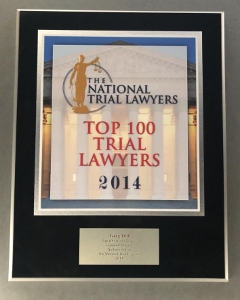A conviction for misdemeanor domestic violence in a California court carries heavy minimum penalties such as attending 52 sessions of an approved batterer’s program, a $500 contribution to a domestic violence fund and at least three years of summary, or informal probation. There is also a criminal protective order with an entry on CLETS (California Law Enforcement Telecommunications System), which landlords of and employers may notice to defendant’s detriment. All these penalties are mandatory with the conviction.
Main Point: Federal lifetime ban on owning a firearm applies after misdemeanor conviction for domestic violence under California law.
For some people, however, the greatest punishment is the ban on owning or possessing a firearm. Under California law, this ban lasts for ten years from the date of the conviction. Under federal law, a lifetime ban applies for the state court conviction.
Is this fair? Should not the lower penalty apply? Is this double jeopardy? Is this cruel and unusual punishment?
 Compton Courthouse
Compton Courthouse
The case of Daniel Chovan tested all these issues. In 1996, Chovan was convicted in California state court in San Diego County of violating Penal Code § 273.5 (a), infliction of corporal injury on a spouse. Chovan was sentenced to 120 days in county jail and then three years of informal probation.
After his conviction, Chovan was barred under California law from owning, purchasing, receiving or having in his possession or custody or control any firearm for ten years. This was due to California Penal Code § 12021(c)(1), which then applied. Under 18 U.S.C. § 922(g)(8), the federal statute that applies to persons convicted of misdemeanor domestic violence, the same ban applied to Chovan, except for life.
Section 922(g)(9) has two exceptions. Those are, first, if the conviction was expunged or set aside. Second, if the offender has been pardoned. 18 U.S.C. § 921 (a) (33) (13) (ii). The exceptions do not apply if the expungement provides that the person still may not possess firearms, as is the case with an expungment under California law.
In 2009, Chovan applied to buy a gun from a San Diego gun dealer. He answered “no” to the question on the application as to whether he had ever been convicted of a crime of misdemeanor domestic violence. This was an absolute lie. His application was denied when his background search revealed his 1996 conviction.

The FBI received notice about Chovan’s attempted purchase and began investigating Chovan. During their investigations, the FBI found videos on the Intenet of Chovan shooting rifles and conducting “border patrols” near the U.S.-Mexico border. They also found out from his ex-wife that Chovan had weapons inside his house.
The FBI then served a search warrant and went to Chovan’s home, where they seized four guns and 532 rounds of ammunition.
A two count indictment was then brought against Chovan, alleging that he had knowingly possessed firearms in violation of § 922(g) and that he had made a false statement in the (attempted) acquisition of a firearm in violation of 18 U.S.C. § 924(a)(1)(A).
In response, Chovan moved to dismiss Count One on grounds that § 922(g)(9)’s application to him was an Equal Protection violation as well as a Second Amendment violation.
The U. S. District Court denied Chovan’s motion because
District of Columbia v. Heller (2008) 554 U.S. 570 had found that § 922(g)(9) was a presumptively valid prohibition and exception from the right to bear arms. Chovan was then convicted on both counts.
Chovan then appealed up to the United States Court of Appeals for the Ninth Circuit. The Court of Appeals, however, affirmed the lower court. It disagreed with Chovan’s argument that he was entitled to own a gun because his civil rights had been restored when ten years passed after his conviction. The Court of Appeals reasoned that Chovan’s civil rights actually had never been “lost,” so they could not be restored and thus § 922(g)(9) was not applicable.
The Court of Appeals then rejected Chovan’s Second Amendment claim on Heller’s ruling mentioned above.
Therefore, Chovan’s conviction was affirmed.
The citation for the Ninth Circuit ruling discussed above is United States v. Daniel Chovan (9th Cir., 2013) 735 F.3d 1127.
For more information about one’s right to possess a firearm, click on the following articles:
- Conviction Overturned for a Felon in Possession of Firearm Because Constructive Possession Not Proven
- Restoring the Right to Own a Firearm After Being Convicted in California of a Crime That Triggers a Ten Year Ban Is No Easy Task
Contact Greg Hill & Associates
 Compton Courthouse
Compton Courthouse